|
|
|
Sort Order |
|
|
|
Items / Page
|
|
|
|
|
|
|
| Srl | Item |
| 1 |
ID:
111040
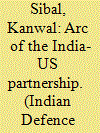

|
|
|
| 2 |
ID:
125936


|
|
|
|
|
| Publication |
2013.
|
| Summary/Abstract |
The 2008 financial crisis wiped trillions of dollars off the value of the world's financial markets, but it did little to halt the explosion in college education. Families from all walks of life and governments of all political persuasions embrace the idea that investing in a college education offers students a route to middle-class prosperity. Difficult economic times in much of the world only reinforce the myth that education triggers economic growth and resolves problems of inequality.
|
|
|
|
|
|
|
|
|
|
|
|
|
|
|
|
| 3 |
ID:
164718
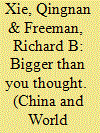

|
|
|
|
|
| Summary/Abstract |
China's advance to the forefront of scientific research is one of the 21st century's most surprising developments, with implications for a world where knowledge is arguably “the one ring that rules them all.” This paper provides new estimates of China's contribution to global science that far exceed estimates based on the proportion of papers with Chinese addresses in databases of international journals. Address‐based measures ignore articles written by Chinese researchers with non‐Chinese addresses and articles in Chinese language journals not indexed in those databases. Taking account of these contributions, we attribute 36 percent of 2016 global scientific articles to China. Taking account of increased citations to Chinese‐addressed articles relative to the global average as well, we attribute 37 percent of global citations to scientific articles published in 2013 to China. With shares of articles and citations more than twice its share of global population or GDP, China has achieved a comparative advantage in knowledge that has implications for the division of labor and trade among countries and for the direction of research and of technological and economic development worldwide.
|
|
|
|
|
|
|
|
|
|
|
|
|
|
|
|
| 4 |
ID:
089877
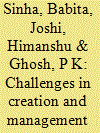

|
|
|
| 5 |
ID:
089878


|
|
|
| 6 |
ID:
138424


|
|
|
|
|
| Summary/Abstract |
The knowledge economy, deindustrialization, and the decline of Fordism have undermined the economic complementarities that once existed between skilled and semiskilled workers. The result has everywhere been a decline in coordinated wage bargaining and unionization and a notable rise in labor market inequality. Yet, the political responses have been very different across advanced democracies. While labor markets for part-time and temporary employment have been deregulated across the board, some countries have compensated losers through increased cash transfers and active labor market programs and others have allowed inequality and insider-outsider divisions to grow deeper. The article argues that the divergent government responses reflect differences in underlying electoral coalitions, and that these in turn mirror the structure of party and electoral systems. The authors support their argument with evidence for government responses to economic shocks in the period 1980 to 2010.
|
|
|
|
|
|
|
|
|
|
|
|
|
|
|
|
| 7 |
ID:
178875


|
|
|
|
|
| Summary/Abstract |
This article explores our experiences of conducting feminist interpretive research on the British Army Reserves. The project, which examined the everyday work-Army-life balance challenges that reservists face, and the roles of their partners/spouses in enabling them to fulfil their military commitments, is an example of a potential contribution to the so-called ‘knowledge economy’, where publicly funded research has come to be seen as ‘functional’ for political, military, economic, and social advancement. As feminist interpretive researchers examining an institution that prizes masculinist and functionalist methodologies, instrumentalised knowledge production, and highly formalised ethics approval processes, we faced multiple challenges to how we were able to conduct our research, who we were able to access, and what we were able to say. We show how military assumptions about what constitutes proper ‘research’, bolstered by knowledge economy logics, reinforces gendered power relationships that keep hidden the significant roles women (in our case, the partners/spouses of reservists) play in state security. Accordingly, we argue that the functionalist and masculinist logics interpretive researchers face in the age of the knowledge economy help more in sustaining orthodox modes of knowledge production about militaries and security, and in reinforcing gendered power relations, than they do in advancing knowledge.
|
|
|
|
|
|
|
|
|
|
|
|
|
|
|
|
| 8 |
ID:
164982
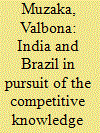

|
|
|
|
|
| Summary/Abstract |
The aim of this article is twofold: first, it seeks to address the question of why the competitive knowledge economy orientation that emerged in certain economically advanced states as a response to the crisis of Fordism came to be embraced by the Indian and the Brazilian states from the late 1980s onwards. Second, it aims to elucidate the manner in which the goal of becoming competitive knowledge economies has been articulated and implemented locally, especially from the mid-1990s onwards, by key fragments of the Indian and the Brazilian states. Drawing on insights from the competition state, regulation school, knowledge economy literature and that on India and Brazil, attention is paid to the context- and conjuncture-specific domestic and international factors that have contributed not only to the adoption of the competitive knowledge economy orientation, but also to the necessarily distinctive ways in which it found expression in practice in India and Brazil.
|
|
|
|
|
|
|
|
|
|
|
|
|
|
|
|
| 9 |
ID:
060915
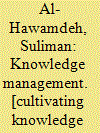

|
|
|
|
|
| Publication |
Oxford, Chandos Publishing, 2005.
|
| Description |
xvii, 222p.Hbk
|
| Series |
Information professional series
|
| Standard Number |
1843340380
|
|
|
|
|
|
|
|
|
|
|
|
Copies: C:1/I:0,R:0,Q:0
Circulation
| Accession# | Call# | Current Location | Status | Policy | Location |
| 049587 | 658.4038/ALH 049587 | Main | On Shelf | General | |
|
|
|
|
| 10 |
ID:
175865
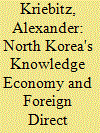

|
|
|
|
|
| Summary/Abstract |
Article Type: Research paper Purpose— This paper examines North Korea's conceptualization of the knowledge economy and discusses the rationale behind the regime's plans of enabling a technology transfer from Western enterprises. The extent to which foreign investment is integrated into the concept of North Korea's knowledge economy is evaluated. Design, Methodology, Approach— This paper evaluates these questions by examining data delivered by international organizations as well as previous literature on the North Korean economy and by systematically analyzing Rodong Sinmun articles and contributions of North Korean researchers in the Journal of Kim Il-sung University. Findings— The North Korean elite is aware of the necessity to cooperate with foreign companies to gain access to new technologies. Nevertheless, North Korea appears to remain distanced when it comes to full liberalization, as it continues to regard too much dependence on foreign forces as a threat to its efforts to become a self-reliant economy. Practical Implications— Due to the explicit reference to foreign direct investment (FDI) and foreign exchange in the knowledge economy, garnering foreign investment in technology-intensive industries appears to be one of the top priorities of North Korean economic policy. Originality, Value— North Korea's pivot to the knowledge economy is examined in terms of cooperation with foreign companies. In this sense, the aim is to bridge research related to FDI in North Korea and literature concerning North Korea's modernization efforts.
|
|
|
|
|
|
|
|
|
|
|
|
|
|
|
|
| 11 |
ID:
157778
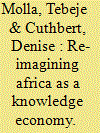

|
|
|
|
|
| Summary/Abstract |
Africa is being re-imagined as a knowledge economy, and higher education (HE) systems have been propelled into the centre of national economic plans and strategies. This paper provides an analysis of four recent major initiatives directed to the revitalisation of HE in sub-Saharan Africa: the Pan African University (2010), the Africa Higher Education Centers of Excellence Project (2014), The Kigali Communiqué on Higher Education for Science, Technology and Innovation (2014), and the Dakar Declaration and Action Plan on Revitalising Higher Education for Africa’s Future (2015). Guided by critical frame analysis, we examined assumptions and expectations of these regionally/globally structured HE development agendas. The findings show that, while there is a convergence of thinking on the promise for economic transformation held by invigorated HE sectors in Africa, there are uncritically adopted premises about how this transformation is to be achieved. In particular, we find that the promise held out for economic transformation through HE is at risk of failing through the inadequate contextualisation of global policy orthodoxies to African conditions, and that some of the premises about the nature and scale of the economic transformation required to make the re-imagined Africa a reality need to be reconsidered.
|
|
|
|
|
|
|
|
|
|
|
|
|
|
|
|
| 12 |
ID:
193047
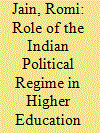

|
|
|
|
|
| Summary/Abstract |
As primary drivers of global growth, China and India as Asian giants are on the path to reforming their higher education systems to drive innovation. This paper based on both primary and secondary data sources investigates how India’s democratic political leadership has facilitated higher education reform for fostering innovation while underlining key differences in the policy approach of the Chinese leadership. Findings identify the areas of reform for India and also reveal that epistemic boundaries between India and China are beginning to blur so far as right-wing ideological regimentation is concerned, with possible implications for innovation.
|
|
|
|
|
|
|
|
|
|
|
|
|
|
|
|
| 13 |
ID:
123779
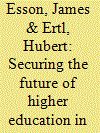

|
|
|
|
|
| Publication |
2013.
|
| Summary/Abstract |
This article reviews the IPPR commissioned report 'Securing the Future of Higher Education in England'. It is argued that the report identifies key shortcomings in contemporary higher education policy, and develops some important recommendations for shaping the sector in the future. However, several of the proposed recommendations would create new divisions in the sector and reinforce existing ones. Moreover, the report maintains and reproduces the ideological status quo of contemporary higher education policy, which can broadly be described as the organisation and provision of higher education along 'quasi-market' lines. Crucially, although the report advocates reform based on social justice, in the contemporary context of fiscal retrenchment, the majority of recommendations are underpinned by, arguably necessary, economic rationales.
|
|
|
|
|
|
|
|
|
|
|
|
|
|
|
|
| 14 |
ID:
122823
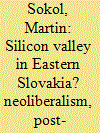

|
|
|
|
|
| Publication |
2013.
|
| Summary/Abstract |
The essay critically examines the prospect of emulating a Silicon Valley-style regional development in the post-socialist context of East-Central Europe. It underlines the problematic nature of the Silicon Valley concept itself and examines the way in which the concept has been 'domesticated' in Košice, a peripheral region in eastern Slovakia undergoing a painful post-socialist transformation towards the market economy. In doing so, the essay also highlights links between neoliberalism, post-socialism and the knowledge-based economy.
|
|
|
|
|
|
|
|
|
|
|
|
|
|
|
|
| 15 |
ID:
134105


|
|
|
|
|
| Publication |
2012.
|
| Summary/Abstract |
Nations that have sought to overcome the resource curse and other barriers to economic growth have pursued, for some time, greater development through a number of strategies: from import substitution in the 1950s to current strategies based on micro-finance and human-capabilities approaches. Needless to say, the international community is still searching for the elusive Holy Grail of an optimal development strategy. One strategy that has attracted greater attention and a growing number of adherents is that of promoting the transition to a knowledge economy. This paper is about one such nation, Saudi Arabia. In analyzing the Kingdom's quest for a knowledge economy, this article hopes to shed light on the anatomy of the strategy itself and identify important preconditions for and barriers to the strategy's success. The case study of Saudi Arabia's quest for a knowledge economy carries important implications and lessons for other nations, especially those with resource economies that are seeking effective plans of economic development and transition.
|
|
|
|
|
|
|
|
|
|
|
|
|
|
|
|
| 16 |
ID:
165599


|
|
|
|
|
| Summary/Abstract |
The transition from Fordism to the knowledge economy in the world’s advanced democracies was underpinned by the revolution in information and communications technology (ict). The introduction and rapid diffusion of ict pushed up wages for college-educated workers with complementary skills and allowed top managers and CEOs to reap greater rewards for their own talents. Despite these common pressures, income inequality did not rise to the same extent everywhere; income in the Anglo-Saxon countries remains particularly unequally distributed. To shed new light on this puzzle, the authors carry out a panel data analysis of eighteen oecd countries between 1970 and 2007. Their analysis stands apart from the existing empirical literature by taking a comparative perspective. The article examines the extent to which the relationship between the knowledge economy and income inequality is influenced by national labor market institutions. The authors find that the expansion of knowledge employment is positively associated with both the 90/10 wage ratio and the income share of the top 1 percent, but that these effects are mitigated by the presence of strong labor market institutions, such as coordinated wage bargaining, strict employment protection legislation, high union density, and high collective bargaining coverage. The authors provide robust evidence against the argument that industrial relations systems are no longer important safeguards of wage solidarity in the knowledge economy.
|
|
|
|
|
|
|
|
|
|
|
|
|
|
|
|
| 17 |
ID:
185974


|
|
|
|
|
| Summary/Abstract |
Karl Polanyi argues that the discipline of economics has emerged from the observations of human beings and their practices existing in a society. Since humans are perceived primarily as social beings rather than economic ones, embeddedness is a necessary and basic condition of the economy. This paper is an attempt to observe study and understand the inter-sectional application of these concepts of embeddedness and ethnic solidarity, in the socio-economic context of the Tibetan refugee community residing in India. Our study’s fieldwork was focused on observing the functioning of the local Tibetan economy in Mcleodganj (Dharamshala), where two Tibetan knowledge systems: the Thangka art and the Tibetan healing system were closely studied, reflecting Tibetan culture, and the community’s effort to preserve and promote these knowledge systems in different economic forms.
|
|
|
|
|
|
|
|
|
|
|
|
|
|
|
|
|
|
|
|
|